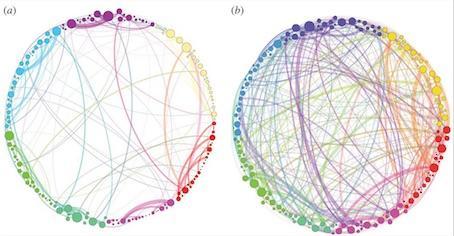Petri et al. show that "the brain's functional patterns undergoes a dramatic change post-psilocybin, characterized by the appearance of many transient structures of low stability and of a small number of persistent ones that are not observed in the case of placebo." A simple reading of their results is that the effect of psilocybin is to relax constraints on brain function, ascribing cognition a more flexible quality. This may account for the transient synesthesia reported by many with psilocybin, hearing colors or seeing sounds.

Simplified visualization of the persistence homological scaffolds. a.) placebo baseline b.) with psilocybinA review of the work by Bone notes:
When ingested, psilocybin metabolizes to psilocin, which resembles the chemical structure of serotonin — a neurotransmitter that regulates mood, appetite, sleep, cognitive functions like memory and learning and feelings of pleasure. Psilocin may simulate serotonin, and stimulate serotonin receptors in the brain...psilocybin therapy could be useful in treating disorders like depression, in which people get stuck in a spiral of negative thoughts. Like electric shock therapy, psilocybin might act like tripping a circuit breaker or rebooting your computer.The Bone review also give links to studies on psilocybin effects on other psychological syndromes.

